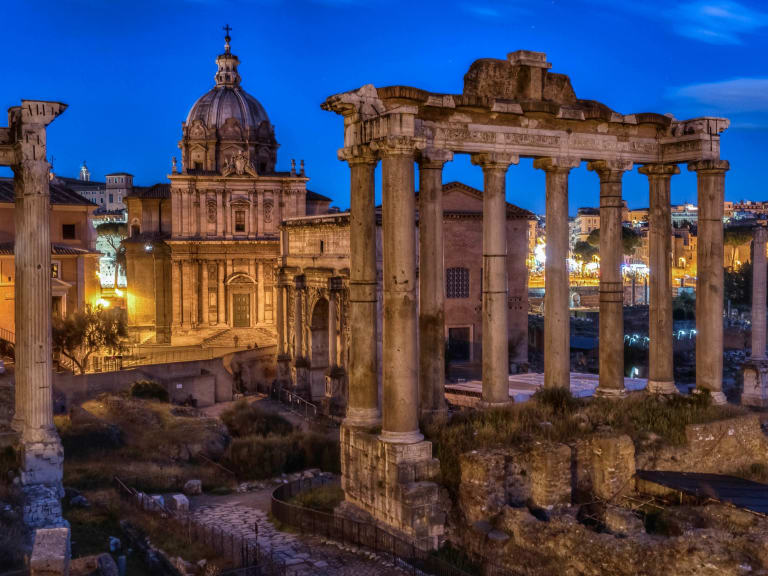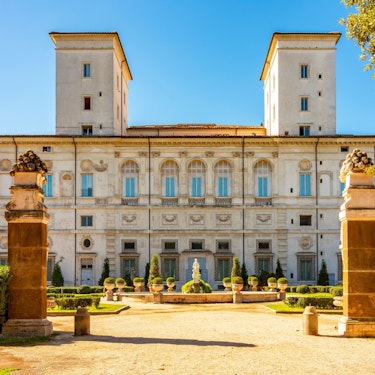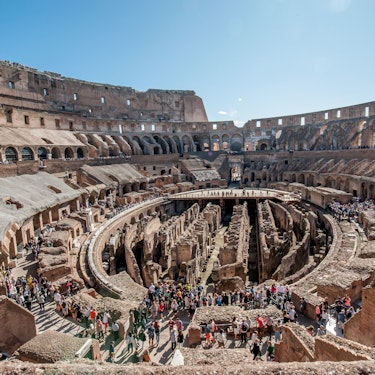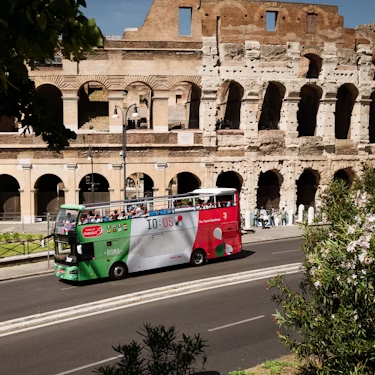More about: 10 Best Museums in Rome
If you are wondering what to see and do in Rome, let me tell you that it is one of the great capitals of the world. A city of undeniable charm, where getting lost in its intricate streets is an adventure in itself. But if you want to learn about its past and discover why art found a privileged place here for centuries, then you should visit its countless museums.
With the Sistine Chapel at the top of the list, with the amazing frescoes of Michelangelo and The Pietà, Rome will leave you speechless. The Capitoline Museums, the Borghese Gallery and of course the GNAM, Rome's modern art museum, because it's not all about the past, are also worth a visit. That's why I've selected for you my favourite museums in Rome, so wear comfortable shoes because here we go!
1. Visit the Vatican Museum and Sistine Chapel

Of course, the first of the museums in my top 10 is the Vatican Museum. It is one of the most famous and visited museums in the world. Located in Vatican City, it boasts an impressive collection of art and antiquities spanning from ancient Rome to the modern era. Every year, millions of tourists flock to the Vatican Museum to see its exceptional works of art, such as the Sistine Chapel and Raphael's School of Athens.
You won't believe the beauty of this place. The Vatican Museum began as a private art collection of the popes in the 16th century. Over the centuries, the popes continued to add works of art and antiquities to the collection, which was finally opened to the public in 1817. Since then, the museum has continued to grow and expand, and today boasts more than 70,000 works of art and antiquities.
Of course, one of the highlights of the site is the Sistine Chapel. It was built at the end of the 15th century and commissioned by Pope Sixtus IV. The chapel is famous for its impressive ceiling frescoes, which were painted by Michelangelo back in 1500. The biblical scenes depicted on the ceiling, including the creation of Adam, are known throughout the world and attract visitors from far and wide. The best option is always to hire a guided tour of the Vatican, although you can also tour the Vatican on your own.
How to get to the Vatican
- Metro: Rome's metro line A has a stop at "Ottaviano - San Pietro", which is the closest station to the Vatican. From there, walk for about 10 minutes until you reach St. Peter's Square.
- Bus: lines 64, 62 and 40.
- On foot: the distance from the Trevi Fountain, for example, is about 2.5 kilometres, which is about a 30-minute walk.
2. Visit the Capitoline Museums, in the heart of Rome

At number 2 I have to put one of the oldest museums in the world. I am talking about the Capitoline Museums, a must for art and history lovers. Founded in 1471, the museums are located around the famous Piazza del Campidoglio, right in the centre of Rome. They are 3 different museums, hence the plural in their name.
A truly impressive collection awaits you here. With a wide range of artworks and historical objects, spanning from ancient Rome to the Renaissance, one of the highlights of the collection is the bronze statue of Marcus Aurelius, which stands in the square in front of the museum, one of the few Roman bronze statues that have survived to this day.
On this visit you will also see the Gallery of the Caesars, which houses the statue of the Capitoline She-wolf, an iconic symbol of the city of Rome and one of the top 10 monuments in the city.
The Capitoline Museums are also known for their beautiful architecture. The museum is housed in a complex of historic buildings, including the Palazzo dei Conservatori and Palazzo Nuovo. The complex was designed by none other than Michelangelo, who also designed the famous spiral staircase leading to the museum. Always remember to check the current opening hours of the Capitoline Museums in advance, as well as the ticket prices.
How to get to the Capitoline Museums
- Metro: Rome's metro line B has a stop at "Colosseo", which is the closest station to the Capitoline Museums. From there, you can walk about 10-15 minutes to reach the square.
- Bus: lines 40 and 64.
- Tram: tram number 8 has a stop in Piazza Venezia, which is a few minutes walk from the Capitoline Museums.
- On foot: the distance from the Trevi Fountain, for example, is approximately 2 kilometres, which is about a 25-minute walk.
3. Visit the beautiful Borghese Gallery

Another must-see is the Galleria Borghese. This is one of the most outstanding art museums in all of Italy and is located in the beautiful Villa Borghese Park in Rome. The museum has an impressive collection of works of art and sculptures, dating mainly from the Baroque and Renaissance period.
Among the works you can enjoy are sculptures by Bernini, such as the Apollo and Daphne, and the David. In this way and according to your criteria, you will be able to discover which are the best sculptures in the Villa Borghese.
You can also marvel at the many works by the famous painter Caravaggio and the 4th century Roman mosaics. The Galleria Borghese has beautiful architecture, designed by the architect Flaminio Ponzio in the 17th century. It is divided into two floors and has painted ceilings and decorations that will leave you speechless.
How to get there
- Bus: lines 910, 19 and 52.
- Metro and bus: you can take line A of the Rome metro to the "Flaminio" station, and then take bus number 910 which will drop you off near the entrance of the gallery.
- Tram: tram number 3 has a stop at Piazzale Flaminio, which is a few minutes' walk from the entrance to the Borghese Gallery.
- On foot: the distance from the Trevi Fountain, for example, is approximately 3 kilometres, which is about a 40-minute walk.
4. Tour the Diocleziano Museum in Rome

Housed in an ancient thermal complex, Rome's Diocletian Museum is a must-see if you are a lover of history and archaeology. The museum has a wide variety of ancient objects and artefacts, including ceramics, statues, coins and other objects dating back to Roman times.
The thermal complex in which the museum is located was built in the 3rd century AD and was one of the largest of its time. The museum preserves some of the original elements of the complex, including the hot and cold water pools and steam rooms. You can see what it was like for the Romans to relax at the time.
This is definitely one of the places to see in Rome in 3 days, as not only is it a first class museum, but it will also give you a glimpse of the lifestyle of the city during the Roman Empire.
How to get there
- Metro: Rome Metro lines A and B stop at Termini station, which is just a few minutes' walk from the museum.
- Bus: lines 85, 64 and 910.
- Train: if you are in another part of Italy, you can take a train to Termini station, which is Rome's main train station.
- On foot: the distance from the Trevi Fountain, for example, is about 3 kilometres, which is about a 40-minute walk.
5. Visit the Galleria Nazionale d'Arte Moderna di Roma (GNAM)

And because it's not all about the past and history in Rome, I suggest a visit to the National Gallery of Modern Art, a place to enjoy the best of 20th and 21st century art. The GNAM is one of the most outstanding museums in Rome and one of the main museums of modern art in Italy. The museum is located in the Villa Borghese park.
Among the highlights you can enjoy here are paintings by French impressionists such as Monet and Degas, works by renowned Italian artists such as Giorgio de Chirico and Amedeo Modigliani, as well as an impressive collection of modern and contemporary art, including works by Picasso and Jackson Pollock.
The architecture of the building that houses the GNAM is impressive in itself, with a neoclassical façade and spacious exhibition halls with high ceilings and an abundance of natural light. Of all the museums in Rome, this one is perfect for visiting with children, as many of the works on display have a playful, colourful spirit.
How to get there
- Bus: lines 52, 53 and 910.
- Metro and bus: you can take line A of the Rome metro to the "Flaminio" station, and then take bus number 910 which will drop you off near the entrance to the Villa Borghese park, from where you can walk to the museum.
- Tram: tram number 3 stops at Piazzale Flaminio, which is a few minutes' walk from the entrance to the Villa Borghese park.
- On foot: the distance from the Trevi Fountain, for example, is about 3 kilometres, which is about a 40-minute walk.
6. Marvel at the Crypt of the Capuchins Museum

Here is a very peculiar museum, only suitable for those who are not easily frightened. This is the Capuchin Crypt Museum, located under the church of Santa María de la Concepción de los Capuchinos. As the name suggests, it is a crypt, which houses the remains of 4,000 Capuchin monks who have died since the 17th century, along with the remains of some of the city's nobility.
You can walk through corridors crammed with skeletons dressed in their best clothes, some with curious inscriptions. The entrance to the museum takes you through a series of chapels decorated with human bones. Most of the bones are arranged in intricate patterns, like arches and candelabra. One of the most impressive chapels is the Crypt of the Skulls, where you can find thousands of skulls arranged in piles and patterns.
There is also a chapel containing the perfectly preserved mummy of a Capuchin monk, Fray Crispin, who died in the 17th century. As you will see, the Capuchin crypt museum is a unique experience. Although it may seem a bit macabre, it is an interesting way to experience the history and culture of the eternal city. And if you're interested in the ecclesiastical, I recommend you visit some of the top 10 churches in Rome.
How to get there
- Metro: The closest metro station to the Capuchin Crypt is the "Barberini" station, which is just a few minutes' walk from the site.
- Bus: lines 52, 53 and 63.
- On foot: the distance from the Trevi Fountain, for example, is approximately 1.5 kilometres, which is about a 20-minute walk.
7. Visit the Castel Sant'Angelo National Museum

Another must-see museum in Rome is the Castel Sant'Angelo, an impressive castle located on the right bank of the Tiber River. This castle was originally built as a mausoleum for Emperor Hadrian in 139 AD and was later used as a fortress and papal residence. Its structure is impressive, with thick stone walls and a cylindrical tower, from which you can enjoy one of the best panoramic views of the city of Rome.
Inside the castle, you'll have a chance to explore a variety of rooms, including the weapons room, the chapel, the treasure room and the room of the instruments of torture (which can be a little unsettling). There are also a series of underground corridors leading to the Vatican, which were used in the past as a secret escape route for popes. Another attraction is the collection of armour, ancient weapons, paintings and sculptures.
How to get to the Vatican
- Metro: The closest metro station to Castel Sant'Angelo is the "Lepanto" station on line A of the Rome metro. From there, you can walk about 10-15 minutes to the castle.
- Bus: lines 23, 34, 49 and 87.
- Tram: tram number 19 has a stop near Castel Sant'Angelo.
- On foot: the distance from the Trevi Fountain, for example, is about 2 kilometres, which is about a 30-minute walk.
8. Enjoy a tour of the Museum of Contemporary Art (MACRO)

Located in the Testaccio neighbourhood, in a former brewery, the MACRO is a contemporary art museum with an extensive collection of artworks by Italian and international artists, with a variety of regularly changing exhibitions. The museum is divided into two sections, the MACRO Testaccio and the MACRO Via Nizza, both housed in renovated historic buildings with modern architecture.
In the MACRO Testaccio you will find a more intimate and cosy space, presenting temporary exhibitions of emerging and established artists. In contrast, MACRO Via Nizza has a permanent collection of contemporary art, as well as temporary exhibitions of national and international artists. Like the GNAM, this is a more modern take on art in Rome.
Since most tourists come to the eternal city in search of the past, you'll find a lot more locals in these museums. It's definitely one of Rome's must-sees for lovers of modern art. The museum closes its doors at 19hs, so when you leave, you can enjoy one of the best pizzas in Rome, an Italian must.
How to get there
- Metro: the closest metro station to the MACRO is the "Piramide" station on the B line of the Rome Metro. From there, you can walk about 10-15 minutes to the museum.
- Bus: lines 75 and 280.
- Tram: tram number 3 has a stop near the MACRO.
- Train: "Roma Ostiense" train station is about 15 minutes walk from the MACRO.
9. Discover the Palazzo Massimo alle Terme

Visit the imposing Palazzo Massimo alle Terme. The building that houses the museum itself is a masterpiece of Renaissance architecture and boasts a large collection of ancient art, including sculptures, frescoes, coins and other artefacts.
The museum is divided into four floors, each with its own themed collection. On the ground floor, you'll see a wide variety of Roman and Greek sculptures, including the famous statue of The Fighter at Rest (or simply The Boxer).
On the first floor, you'll see the collection of Roman frescoes and paintings, including works by great Italian masters such as Caravaggio and Tintoretto. On the first floor, a large collection of Roman, Greek and Etruscan coins is on display. Finally, on the upper level, you will be able to see a large number of ancient jewellery, including rings, brooches and earrings. A perfect museum to learn more about the city's past.
How to get there
- Metro: the closest metro station to Piazza Massimo alle Terme is the "Termini" station on the A and B lines of the Rome metro. From there, you can walk about 10 minutes to the square.
- Bus: lines 16, 38, 75 and 360.
- Tram: tram number 5 has a stop near Piazza Massimo alle Terme.
- Train: "Roma Termini" train station is only a few minutes walk from the square.
10. Visit the Imperial Roman Forum and its museum

And number 10 is the Museo dei Fori Imperiali. It is an archaeological museum located in the heart of Rome, in the Imperial Forum complex. It was inaugurated in 2007 and has a large collection of artefacts and objects that show the history and archaeology of the ancient forums.
There are several exhibition halls covering different periods of Roman history. The permanent exhibition includes miniature models of the Imperial Forums, as well as frescoes and ancient mosaics. There are also a large number of ancient artefacts, such as coins, sculptures and objects of daily life, so a visit to the museum is essential.
The museum also offers temporary exhibitions exploring different aspects of the history and archaeology of the forums. These exhibitions have included topics such as the role of women in Roman society and the ancient building techniques used.
How to get to the museum
- Metro: The closest metro station to the Piazza dei Fiori Imperiali is the "Colosseo" station on line B of the Rome Metro. From there, you can walk about 10-15 minutes to the square.
- Bus: lines 51, 75 and 85.
- Train: "Roma Termini" train station is about 30 minutes walk from the Roman Forum.
























